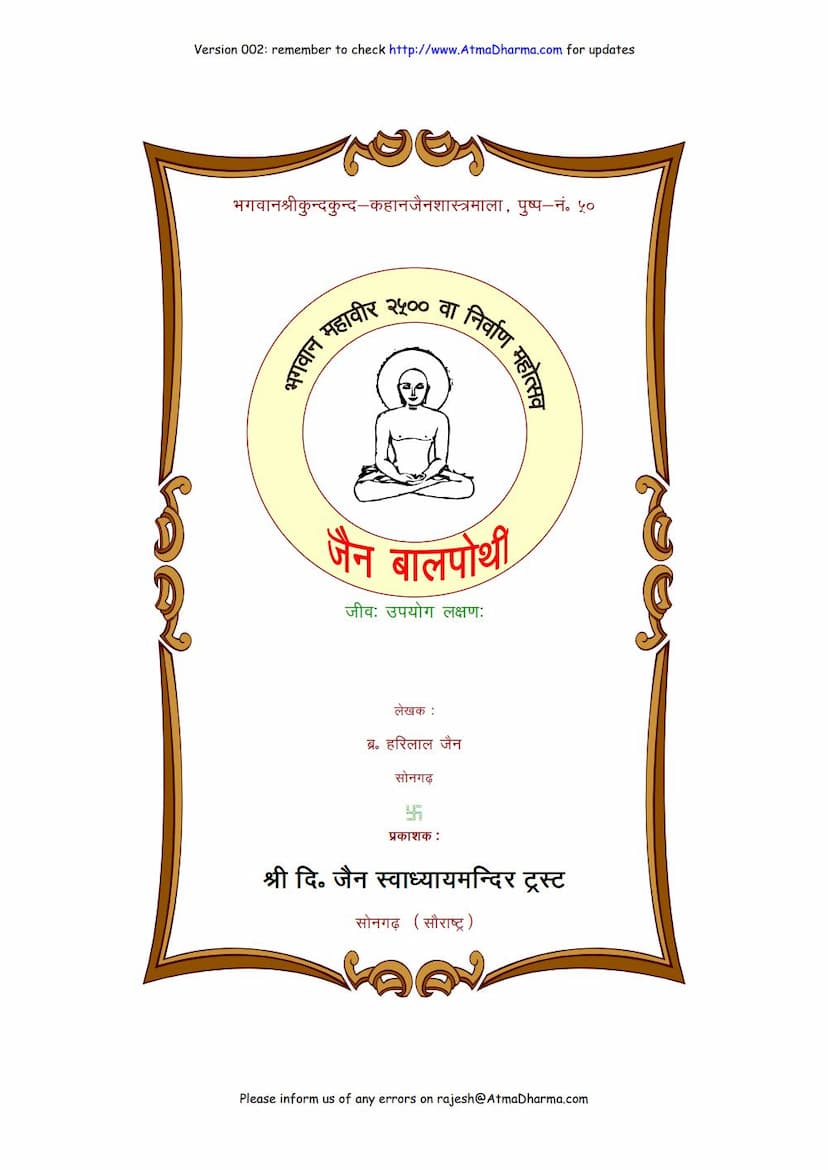Jain Balpothi
Added to library: September 1, 2025

Summary
This document is a comprehensive summary of the Jain religious text "Jain Balpothi," authored by Brahmachari Harilal Jain and published by Shri Digambar Jain Swadhyay Mandir Trust. The book is designed to introduce fundamental Jain principles to children in an engaging and accessible manner.
Core Purpose and Audience: The "Jain Balpothi" (Children's Book) is intended for children aged eight to ten years old, aiming to cultivate an interest in Jain philosophy and teachings from a young age. It achieves this through short, child-friendly lessons accompanied by illustrative pictures.
Key Themes and Content: The book covers a wide range of essential Jain concepts, presented in a progressive and understandable sequence. The table of contents (अनुक्रमणिका) reveals the topics covered:
-
The Nature of Existence:
- Jiv (जीव): The soul or living being.
- Sharir (शरीर): The physical body.
- Jiv and Ajiv (जीव और अजीव): The fundamental distinction between the soul and non-living matter.
- Dravya-Guna-Paryay (द्रव्य-गुण-पर्याय): The Jain metaphysical concepts of substance, attributes, and modes.
-
Principles of Jainism:
- Pariksha (परीक्षा): Examination or testing of understanding.
- Haan aur Na (हाँ और ना): Affirmation and negation, used to solidify concepts.
- Dharma (धर्म): Righteousness or the natural disposition of a substance, particularly the soul.
- Samajh (समझ): Understanding.
-
The Three Jewels (Triratna) of Jainism:
- Samyakdarshan (सम्यग्दर्शन): Right Faith or Belief.
- Samyagyan (सम्यग्ज्ञान): Right Knowledge.
- Samyakcharitra (सम्यक्चारित्र): Right Conduct.
-
Venerable Figures and Texts:
- Bhagwan (भगवान): God or enlightened beings.
- Guru (गुरु): Spiritual preceptors.
- Shastra (शास्त्र): Sacred scriptures.
-
Biographies and Stories:
- Shri Mahavir Bhagwan (श्री महावीर भगवान): The life and teachings of Lord Mahavir, the 24th Tirthankara.
- Raja ki Kahani (राजा की कहानी): A story about a king, likely illustrating the principles of non-violence or detachment.
-
States of Being:
- Mukt aur Sansari (मुक्त और संसारी): Liberated beings and worldly beings.
-
The Soul and Karma:
- Jiv aur Karma (जीव और कर्म): The relationship between the soul and karmic matter.
-
Ethical Teachings and Practices:
- Itna Karna (इतना करना): Specific daily practices.
- Achhi Achhi Shikshayein (अच्छी अच्छी शिक्षायें): Good teachings.
- Kabhi Nahi (कभी नहीं): Things to avoid.
- Dhun (धुन): A tune or refrain (likely in a song or prayer).
- Vandan (वन्दन): Salutations and respects.
- Atmadev (आत्मदेव): The soul as God.
- Mujhe Batao (मुझे बताओ): A question-and-answer format.
- Meri Bhavna (मेरी भावना): Aspirations or feelings.
Educational Approach: The book emphasizes that mere memorization is not sufficient. Children are encouraged to understand the meaning behind each lesson, with the help of the accompanying illustrations. Practical application, such as singing devotional songs (keertan) with musical instruments, is also recommended. The publisher strongly advocates for parents to instill these teachings in their children from a very young age, likening it to feeding them with the essence of Dharma along with their milk.
Impact and Reach: The "Jain Balpothi" has achieved significant popularity within the Jain community, with over 146,000 copies printed across five languages (Hindi, Gujarati, Marathi, Kannada, and English) through 30 editions. This widespread adoption is considered a matter of pride for Jain literature. The author, Brahmachari Harilal Jain, was recognized with a gold medal by Shri Akhil Bharat Di. Jain Mumukshu Mandal for his contribution. A second part of the "Jain Balpothi" has also been published.
Underlying Philosophy: The core message throughout the book revolves around understanding the true nature of the self (the soul or "Jiv") as distinct from the physical body ("Sharir"). It highlights that the soul is the entity that possesses knowledge, while the body is inert. The ultimate goal is to attain liberation (Moksha) by recognizing the soul, shedding attachment and aversion (Raga-Dvesha), and practicing the path of Right Faith, Right Knowledge, and Right Conduct. The teachings are presented in a way that emphasizes self-realization and spiritual purity.
In essence, "Jain Balpothi" serves as a foundational text for young Jains, introducing them to the profound philosophical concepts of their religion in a simple, engaging, and memorable way, encouraging them to embark on their spiritual journey from childhood.